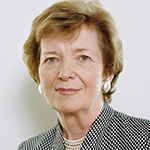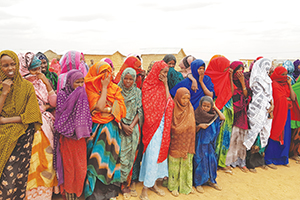By JULIE MINDA
Stateswoman and environmental justice advocate Mary Robinson said during her June 14 Catholic Health Assembly talk that the pandemic has shone a bright light on the inequalities pervasive around the world — between the strong and the vulnerable and the rich and the poor — and in many ways exacerbated those inequalities. But learnings from the pandemic, she said, can be extrapolated to advance climate justice.

Dr. Marcella Nunez-Smith
Robinson, the president of Ireland from December 1990 to September 1997, founded and heads the Mary Robinson Foundation — Climate Justice. That organization advocates for the rights of the disempowered and marginalized in the international politics around the effort to contain global warming. A former United Nations high commissioner for human rights, she also served as the U.N. secretary general's special envoy on climate change. Robinson is a founding member and current chair of The Elders, a group of global leaders Nelson Mandela assembled to tackle pressing global problems.
She said climate change is impacting much earlier and much more severely the poorest communities, the small island states and the indigenous people of the world — many of whom happen to be Black and brown. Even in rich countries like the United States it is Black and brown people who are more impacted by environmental injustice, she told the audience.

Ethiopian women wait in line to receive food aid due to drought conditions in the Danan district of the Somali region of Ethiopia in September 2017. That region hadn't seen significant amounts of rain in three years at that time. Environmental justice advocate Mary Robinson said droughts like the ones that strike African nations have a disproportionate impact on women.
Elias Meseret/Associated Press
Women in the developing world may shoulder even heavier burdens than their male counterparts as the planet heats up and weather patterns change, she said. In poor villages, women who have to put food on the table may have to go farther for firewood because of deforestation or travel longer distances to collect water. In many places in the world women have little to no property rights, and very little power. They are among those who are the least responsible for — and get no economic benefit from — the carbon-based economy driving climate change.
The Mary Robinson Foundation — Climate Justice has been advocating on the world stage for women, the poor in the developing world and the young to have input into public policy on climate change and protections in green initiatives.
In her address, Robinson identified some lessons from the pandemic response that she believes have applications for climate justice.
The pandemic response showed that collective behavior can protect the most vulnerable in a community. Many people who were not at high risk for COVID complications nevertheless adhered to social distancing and masking guidelines. They did this in order to reduce viral spread and protect the elderly as well as those with compromised immune systems and underlying chronic illness. Robinson said collective action for the common good will be necessary to reduce reliance on fossil fuels and usher in the green economy. She said it will be important to protect and retrain employees who could lose jobs in the transition to clean energy industries.
The pandemic showed that the quality of a government's response to crisis matters, Robinson said. Governmental leaders who bungled the response to the coronavirus threat prolonged suffering in their countries and communities, whereas those who responded well, mitigated harm.
Fighting climate harm similarly will require effective government leadership. Robinson noted that many of the world leaders responding effectively to global crises are women. She said such leaders include New Zealand Prime Minister Jacinda Ardern, German Chancellor Angela Merkel, Norwegian Prime Minister Erna Solberg, Finnish Prime Minister Sanna Mirella Marin and Iceland Prime Minister Katrín Jakobsdóttir.
Just as science guided the most effective responses to the pandemic, Robinson said, it also will be key to addressing climate injustice. A recent report from the World Meteorological Organization, a U.N. agency, says there is a 44% chance average global temperatures will increase by 1.5 degrees Celsius in the next five years. That level of warming, if sustained, could bring massive flooding and storms, along with severe drought and hunger.
To prevent this devastation, all countries must transition away from fossil fuel-dependent economies — and quickly, Robinson said.
Robinson challenged her audience at the virtual assembly session to make climate justice personal by taking steps in their own lives to use resources more efficiently — to recycle carefully and waste less. She said citizens should get angry and demand action from governments and corporations. "We need political will generated top-down and bottom-up everywhere in the world," she said.
Decisive actions will come easier if everyone imagines the world as it could be — a place where clean energy results in cleaner air and economic advancements in the developing world. Borrowing a term used by anti-apartheid and human rights activist Archbishop Desmond Tutu, Robinson called upon Catholic health leaders to be "prisoners of hope." She heard the archbishop use the term in response to a journalist who asked how the cleric could be so optimistic given the state of the world. "I'm not an optimist," Archbishop Tutu said, "I'm a prisoner of hope."
Robinson said before COVID-19 she'd worried that the global community would not rise up together to effectively pursue climate justice and stop climate change. But, she said, the pandemic made it apparent "we are all somehow in this together."
She quoted Mandela, the late South African anti-apartheid leader and president of South Africa, on persevering to achieve great change or progress against great obstacles. "It always feels impossible, until it's done," he said.